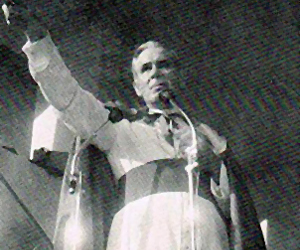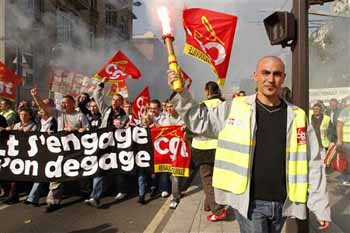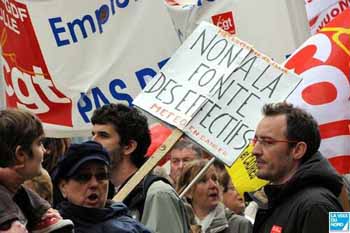 |
Socio-Political Issues
Sheen’s Co-Ownership Is Opposed
to Catholic Teaching
Patrick Odou
In the talk I quoted in my last article, Archbishop Fulton Sheen essentially said this: Just as the stockholder who invests his money in a corporation shares the profit the business makes, so also the worker, who gives his labor and time, must also share that profit. Further, the worker should share ownership of the business. This effectively denies the rights of private property and proposes installing the regime of co-property or self-management of the enterprise by both employer and employees.
Then, I went on to remark on the flaws of logic that are present in this simplistic reasoning. Today, I will analyze the core of the Archbishop’s suggestion.

Sheen points to self-management |
If one follows Natural Law, I believe that the notion of co-ownership is false. Indeed, it used to be that a man who worked hard and saved his money could purchase a property, a legitimate and just fruit of his labor. The property he purchased is a reflection of his previous labor. Also, his profit that allows him to hire another person to work for him is a reflection of his previous labor. Following this process, a worker becomes a legitimate owner.
The employee, for various reasons, did not save and does not have enough to live without working for someone else.
Therefore, to claim that both the owner and the employee have the same right to the former’s property is a proposal that harms the industrious man and benefits the less industrious. This injustice violates Natural Law.
Further, in the Gospel there are many parables involving owners and laborers that present the wage system as a just and sufficient form of remuneration for a man’s work. It clearly condemns as unjust laborers who want more than the agreed-upon wage (Mat 20: 1-15).
Finally, we have the Popes who taught us the opposite of what Sheen proposes. For example, Pius XII had these expressive words against co-ownership:
“It is for this reason that Catholic social teaching, besides other things, so emphatically champions the right of the individual to own property. Herein also lie the deeper motives why the Pontiffs of the social encyclicals, and also we ourselves, have declined to deduce from the labor contract - directly or indirectly - the right of the employee to participate in the ownership of the operating capital, and its corollary, the right of the worker to participate in decisions concerning operations of the plant (Mitbestimmung).
“This had to be denied because behind this question there stands that greater problem – the right of the individual and of the family to own property, which stems immediately from the human person. It is a right of personal dignity; a right, to be sure, accompanied by social obligations; a right, however, not merely a social function.” (1)
In another article I have quoted other papal teachings on how legitimate the system of capital-work is according to Catholic doctrine.
Thus, contrary to what Archbishop Sheen pretends, the Church has constantly rejected the idea that in the labor contract - the agreement between employer-employee, capital-labor, owner-worker - the employees are entitled to “co-own” or “co-manage” the place where they work.
Self-managing Socialism
The claim of Bishop Sheen that Communism is no friend of co-ownership is also false. We know that Communism - as it was established in Russia in 1917 against the “dictatorship of the bourgeoisie” - was considered by its own founders as a transitory phase, the dictatorship of the proletariat. According to Marxist doctrine, another ideal phase should come where a balance would be found - the final synthesis - which is defined in the actual Soviet Constitution as being self-management. In fact it reads:

Socialist Workers march in Paris and Marseille against property as a source of profit. An ideal they share with Sheen.
 |
“The supreme objective of the Soviet State is the building of a communist classless society in which communist social self-management will develop.” (2)
So, what we have is Archbishop Sheen clearly promoting the last phase of Communism, which is co-ownership and self-management. (3)
What Gorbatchev tried to achieve with his perestroika (re-structuring) and glasnost (transparency) was to end that second phase of Communism, and start the third, self-management. Sheen did the same. He was preparing the United States, I believe, to accept and merge with that more advanced stage of Socialism that would come as the final step of Communism.
The Distributist connection
The Socialist thinking of this popular American Archbishop who was so influential before, during and after the Second Vatican Council is one thing that makes this speech so interesting.
Another interesting point is what this speech reveals about Distributism. Why did the The Society for Distributism post Sheen’s talk online and raise it as a banner of its own ideals?
It is understandable because, first, Distributists pretend that their thinking is based on Catholic Social Doctrine, and Sheen reinforces the same untruth. Second, because Distributists imagine , as Sheen does, that they are not Socialists: “We Distributists are not Socialists. Socialists are against ownership. We want, in the immortal words of Pope Leo XIII, to make as many as possible of the people become owners.”
Cross-analyzing what Distributists and Sheen say, we understand what the former means by making “as many as possible of the people become owners.” They seek a Socialist takeover of a business or enterprise, giving “co-ownership” and “co-management” to all workers. Distributism wants a wide distribution of ownership by means of co-ownership of industries, land or any other sources of production.
We have to thank Fulton Sheen for helping us to understand so many things…
1. Pius XII, Discorsi e Radiomessaggi di Sua Santita Pio XII, vol. XIV, p. 314, English text from The Catholic Mind, Jan. 1953, apud Plinio Correa de Oliveira, "What Does Self-Management Socialism Mean for Communism, A Barrier or a Bridgehead?" December 9, 1981.
2. Constitution – Ley Fundamental de la Union de Republicas Socialistas Sovieticas, October 7, 1977, Moscow: Editorial Progreso, 1980, p. 5, apud Plinio Correa de Oliveira, "What Does Self-Management Socialism Mean for Communism, A Barrier or a Bridgehead?"
3. Regarding this subject of Self-Management Socialism which, as we see, is being promoted by the Society for Distributism, I highly recommend "What Does Self-Management Socialism Mean for Communism, A Barrier or a Bridgehead," by Plinio Correa de Oliveira. I have never read a better work for explaining the ultimate goals of Socialism and Communism. An online copy can be found here.

Posted April 26, 2010

Related Articles of Interest
 Archbishop Fulton Sheen’s Flaws in Rhetoric Archbishop Fulton Sheen’s Flaws in Rhetoric
 Bishop Sheen, an Enthusiast of Vatican II Bishop Sheen, an Enthusiast of Vatican II
 Self-Management: the Next Step after Communism Self-Management: the Next Step after Communism
 What Does Self-Management Socialism Mean for Communism? What Does Self-Management Socialism Mean for Communism?
 Salaries and Investments Are Praised in the Gospels Salaries and Investments Are Praised in the Gospels
 Distributists Misleading about Papal Teachings Distributists Misleading about Papal Teachings
 Eric Gill, Precursor of Vatican II Eric Gill, Precursor of Vatican II
 Belloc the Liberal I - His Support of the French Revolution Belloc the Liberal I - His Support of the French Revolution
 A New Model of Church Is Shaped in Chiapas A New Model of Church Is Shaped in Chiapas
 Fulton Sheen on John XXIII Fulton Sheen on John XXIII
 An Encyclical to Foster the Revolution An Encyclical to Foster the Revolution

Related Works of Interest
|
|
Social-Political | Hot Topics | Home | Books | CDs | Search | Contact Us | Donate

© 2002- Tradition in Action, Inc. All Rights
Reserved
|
 |
|